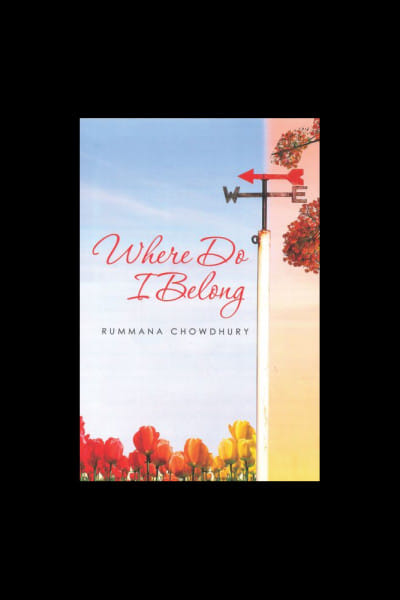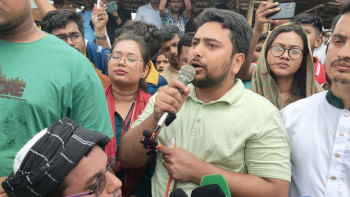Where Do I Belong

While reviewing the book Dr. SHAHID ALAM finds the writer's imagery vivid, colourful, at times romantic, often powerful…
Rummana Chowdhury announces herself, or, at least, part of her feelings, in this line: "Some things are forever ingrained in the innermost crevasses of your heart, no matter where you live or what you do" ("Hot Apple Fritters and Hot Roshogollas"). Here she expresses a diasporic dilemma that not a few Bangladeshi expatriates feel, but she also explores a number of other issues dear to her heart in her anthology of mostly poems, with a smattering of prose pieces, that make up Where Do I Belong. Rummana Chowdhury composed them between May 2013 and August 2014, with the (ambitious) "hope that people from diasporic communities, who know what it means to search for home and belonging in multiple places at once, can relate to my writing and possibly be empowered to retell their stories of diaspora, too, because it is by hearing these stories that we all become humans of a global world" ("Preface"). And, as she comes across from her writings, Rummana Chowdhury is a humanist, an important part of which she manifests by her declaration in the book that all profits from its sale will be donated to the victims of the recent Savar tragedy.
Chowdhury has authored eighteen books comprising of poetry, short stories, and essays, and has won numerous awards, including Woman of the Year (Canada 2010), Shouhardya Shommanona (India 2013), International Michael Modhusudan Datta Award (India 2014), and, most recently, Satyendra Nath Datta Award (Kolkata, India, 2015). She is an activist in human rights issues, specifically in the areas of gender inequality, violence against women, immigration, and diasporic life. In her Foreword to Where Do I Belong, Dr. Kathleen O'Connell of the University of Toronto, Canada, fairly sums up what would be the reader's ideal approach to the book: "In all, these poems --- whether prose meditations on the spiritual/philosophical --- comprise a body of work that is not meant to be read casually or in a light manner."
Chowdhury bridges the diasporic gap in her homage to her adopted homeland, Canada, and its various programmes in aid of humanity, in the short essay "The Pitter-Patter of the Blessed Rain", and in her wistful recollection of her youthful days in her birthplace of Bangladesh in the reflective poem "Monsoon Music":
"The music of the rainfall
Resounds in our hearts
As if there is no tomorrow."
She lets loose a burst of emotion, of suppressed anger, against man's inhumanity to man and some of the instruments that are used to that effect:
"…to keep my fingers from the triggers of those guns
those ugly cold metals breaking innocent lives
those atomic bombs splattering newborn babies
I look at the mangled bodies of blameless people
poetry from the souls of unidentified writers…." ("Not at Liberty")
She continues on the theme in the poem "A Tale of Silence":
"Silence which speaks for itself
a silence after the explosion at Hiroshima…
… after the Khemer Rouge starts its operation…
… at a Buddhist monastery in Thailand…
… after Israel attacks Gaza with double force
… when newspapers all over the world stop…
… after the genocide of 1971 in Bangladesh…
… as the answers are sought in Chernobyl…
… as the Day of Judgement
comes upon us…"
She relentlessly pursues this theme in the essay "Blood Road", where she adds: "The occupation of Afghanistan. Rwandan genocide. Palestine. Bosnia. Somalia. 9/11 in The United States, and endless such human atrocities." Missing from her passionate indictment is the matter of geopolitics in action, an unpleasant reality in international politics, but that only reinforces her innate humanity and the soul of a poet. In an ideal world….
Chowdhury rails against gender inequality in "Expectations": "I take off my sandals and each and every coloured bangle that had been enclosing me from time immemorial into the captivity of age-old society and religion." And, in "Epic Tale of Women":
"The downtrodden women down through the ages
Have been tortured, persecuted, and suppressed
………………….
They belong to more than fifty percent of all people
Yet their pain and humiliation is shared by none"
She brings out the aftermath of domestic violence on the victims: "But even after recovery, the mental and physical degradation leaves a permanent limp as they continue their walk of life" ("Walk a Mile in Her Shoes"). Chowdhury longs to be a catalyst for change, to right the wrongs of her perception, and is confident she can do so, if only metaphorically: "And I know I could change the next universe" ("I Do Not Want to Survive, I Want to Live"). Her optimism, however, is tempered by a sigh of lament, of a sense of inability to break a cycle, of, in a sense, a despairing surrender to reality, in "From Captivity to Captivity":
"I was a free-spirited eagle gliding over hills and dales valleys
and mountains
Until I found my destiny in a golden gilded cage of life's endless bounties
Little did I realize that there were no outlets for me to make
my final exit
There was only the reflected sky which had invisible locks and bars
in all directions."
She seems to be equally despondent about the frenetic pace of life in the suggestive title "This Rat Race":
"No one tries to stop the pace of this rat race…
And one day the clock of life
stops forever…"
However, Chowdhury does not dwell morbidly on death, except, even after all these years, in poignantly expressing the loss of her parents:
"I could not embrace my beloved mother as she left this unwelcoming world" ("I See My Tomorrow in Your Smile").
And, in "Standstill":
"The world had stopped turning
For me and my unknown universe
When my precious mother had left
And for years I could not sleep
……………
I had cried out in
the pitch darkness
For my silent beloved father
Who had left me long before…."
She is a sensitive soul who celebrates life, who appreciates the high arts, especially music, and uses nature as a metaphor for her own emotions. We come across this nostalgic yearning for Bangladesh in "Radhachura Kathalchapa and Bogainvillea (sic)":
"But as I gaze at the golden aura of the
breathtaking radhachura
the mellow white of the Kathalchapa
intermingled with the pink and magenta bougainvillea
surrounding me
……………..
my breath is taken away and I relax
amidst this long forgotten ethereal unbelievable bliss of
my birthplace."
Chowdhury alludes to music on several occasions, which, on the face of evidence, seems to indicate a love for the eshraj, mentioned at least in three separate pieces, including one titled "Melody of the Eshraj".
Rummana Chowdhury, however, never strays too far off from her innate sense of humanity. In the poem "In the Solitude of the Night", she ponders:
"Some questions can never be answered
the questions about life's warm rationality and death's cold reality
the philosophy of war and peace
the boundaries of right and wrong
the imbalance between the haves and the have nots
The resolute silence of Buddha…
is most wise under the circumstances"
In the essay "Friday the Thirteenth of September Two Thousand and Thirteen", she deplores the "Countless masses of unknowing people spread all over the world eradicated and crippled by cyclones, floods, earthquakes, wars, religions, and games of politics and power plays."
The optimist in Chowdhury cannot, though, be drowned by despair:
"Let us start the clock of life once again
Let us row our boat together to a new horizon" ("Face to Face").
Rummana Chowdhury's imagery is vivid, colourful, at times romantic, often powerful, although one might be quizzical about the correlation depicted between Pablo Neruda's poetry and masturbation:
"…he thinks of Neruda's poetry
as he masturbates in the shower" ("Rejoice").
On a minor note, the word "lightening" is used in at least two separate pieces when clearly the context demanded "lightning" instead. Where Do I Belong will take the reader to the mind of a sensitive soul, one who cares intensely about humanity and all the wrongs done to it, or in its name, but never loses touch with beauty in its most varied and pristine forms.
The reviewer is actor and educationist.

 For all latest news, follow The Daily Star's Google News channel.
For all latest news, follow The Daily Star's Google News channel. 



Comments